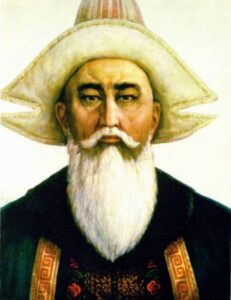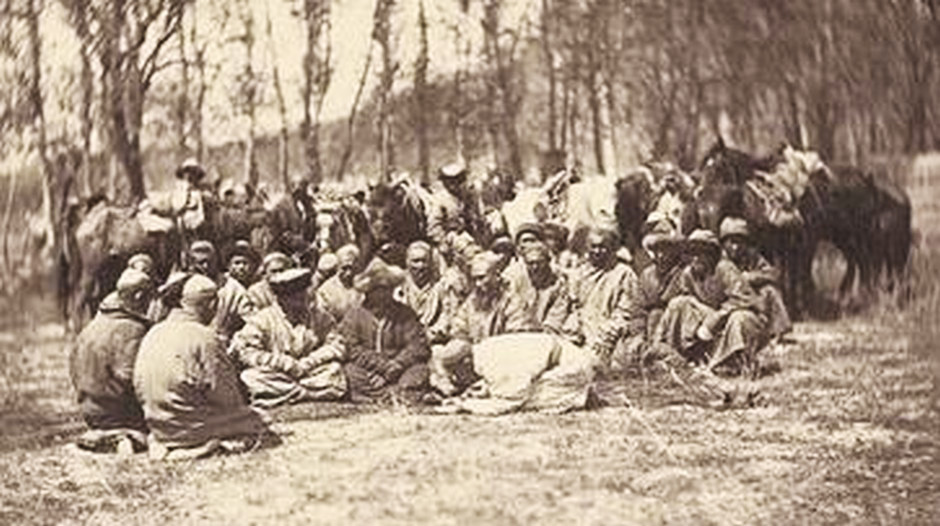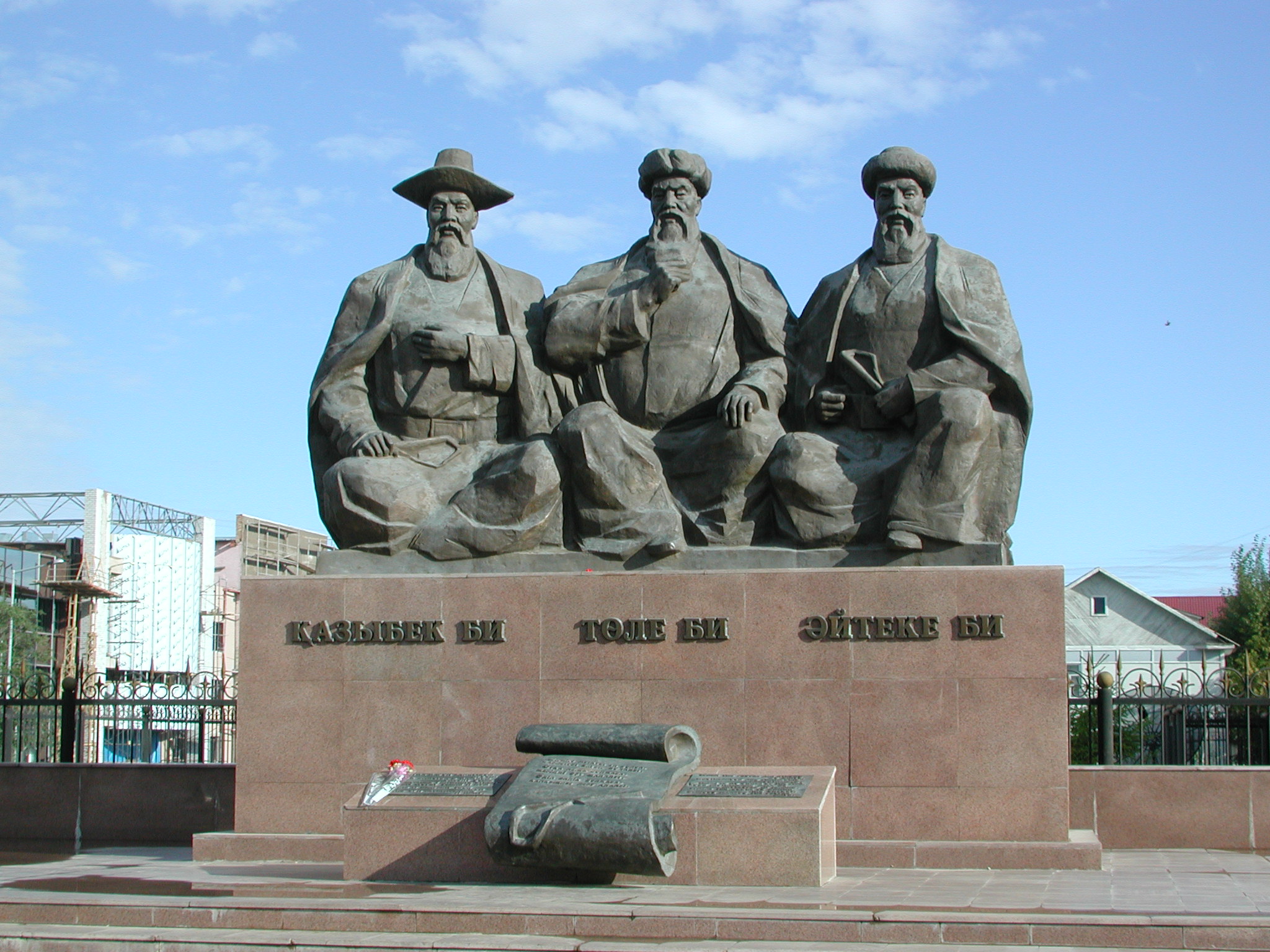ASTANA – Kazakhstan celebrates 355 years of arguably one of the greatest Kazakh judges and a master of the word, Kazybek bi (bi – noble judge), who used language to unite the Kazakh people under one ruler and settle cross-border, regional and local disputes.

Kazybek bi
Kazakhstan is home to several of the region’s greatest orators and masters of language, but outside Central Asia, their key personalities are largely unknown. One of them is Kazybek bi, who was highly distinguished within his own profession as a judge and peacemaker and as a man who always spoke with clarity, wit and absolute logic.
This is a man who not only witnessed the Dzhungar aggression, a period of peace under the rule of Tauke and the strengthening of relations between Kazakhs and the Russian Empire but also contributed to one of the major law texts that could be considered the foundation of the Kazakh classic code of law dubbed the Zheti Zhargy (Seven Charters).
He was born in 1667 in the coastal area of the Syrdarya River in southern Kazakhstan. His rare life records, preserved oral folk legends and samples of oratorical works show that he was a deeply educated man of his time, knowledgeable of the folklore, traditions, customs and laws of the Kazakh people.
In this decade, over 250 years after Kazybek bi’s death, his legacy is recognized widely among the Kazakh people to the point of him becoming one of the most respected founders of Kazakh traditional law and justice as well as philosophy. The influential contributions of Kazybek bi have stood the test of time.
What should be remembered about Kazybek bi today?
Kazybek bi as a peacemaker
Kazybek bi’s diplomatic skills helped to amicably settle numerous disputes between Kazakhs and the various aggressors coming onto their territory in the 18th century.
One occasion, in particular, stands out as a fine example of Kazybek bi’s extraordinary strengths as a peacemaker.
In 1742, he went to negotiate with Galdan Tseren, the huntaiji (ruler) of the Dzhungar Khanate, occupying the territory of today’s western China and eastern Kazakhstan, who had captured the young warlord Sultan Abylay.

The court of bis was a very reputable institution that resolved many disputes at an individual level as well as between the nomadic tribes. A wise bi was highly respected among the people and his decisions were strictly followed. Photo credit: e-history.kz
Few figures could deliver an eloquent speech to powerful rulers without making their blood boil – either with ruthless logic or in the spirit of dignity – quite like Kazybek bi, who told the Dzhungar ruler the following words:
“If a son is born to a father, he is not born to be a slave. If a daughter is born to a mother, she is not born to be a slave. If you are iron, we are coal – we came to melt you. We came to an unfamiliar foreign country to get to know each other. If you do not agree to know us, we came to combat. If you are a leopard, I am a lion – we want to fight or stick together like yellow glue. If you agree, tell me about your situation. If you do not, tell me where to line up for the battle.”
Through the mediation of Kazybek bi and the help of the Russian authorities, Sultan Abylay, the future khan who united all three zhuzes (alliances of Kazakh nomadic tribes), was rescued from captivity along with 33 towns captured by the Dzhungars.
It is said that Galdan Tseren, after this encounter with Kazybek bi, dubbed him “kaz dauysty Kazybek ” which translates to goose-voiced Kazybek and has the figurative meaning of having a piercing voice.
Kazybek bi’s contribution to lawmaking
In his time, Kazybek bi was regarded as the foremost authority of the law and justice.
He managed the Middle Zhuz along with his fellow bis – Tole bi from the Great Zhuz and Aiteke bi from the Small Zhuz – under the rule of Tauke Khan and remained an adviser on foreign and domestic affairs later under the khans Samek, Abilmambet and Abylay.

A monument in Atyrau to the three Kazakh prominent bis who established the foundation of Kazakh code of laws. From left to right: Kazybek bi, Tole bi, Aitekek bi. Photo credit: bugin.kz
He masterfully solved local disputes based on his knowledge of legal and historical precedents. His decisions were fair and he was known as “a true reasoner.”
He is also regarded as a key contributor to the creation of the Zheti Zhargy, a code of law drawn up from traditional rules of Kazakhs’ everyday life and requirements of the time, which was used by the Kazakh people until the mid-19th century.
At the foundation of the Zheti Zhargy are the principles of adat (local customary practices) and sharia (Islamic law). There were sections on property and land, family-marriage relations with the rights and obligations, the law on punishment for various crimes, including the payment of qun (compensation for grave crimes) and the law on widows, which regulated the rights of orphans and widows.
His contribution to the unification of Kazakhs under one khanate
To understand Kazybek bi’s contribution to the unification of the Kazakh Khanate, it is important to remember that in the 18th century, the Kazakh tribes and zhuzes living on the territory of Kazakhstan were somewhat divided and they were constantly under attacks from Dzhungars.
In such circumstances, Kazakh bis played a significant role in maintaining order on the territories of zhuzes they managed. The khans closely listened to the bis because they had the ability to influence the people.
Kazybek bi often talked about issues that engaged the public, such as the big questions regarding morality, ethics and justice. His speeches were noted for their aphoristic nature and many of his sayings went into folklore as proverbs and sayings. He used language to express the highest truths on unity, dignity, peace and tolerance.
Serving under Abylay Khan, Kazybek bi supported the unification of the Kazakhs under one centralized rule.
“One for the fact that a disunited country is bad. Two for the fact that grown men being at odds is bad,” said Kazybek bi, preaching for unity at all levels of society.
According to historical records, he died in 1764 at the foothills of the Semizbuga mountain on the territory of the modern Karagandy Region. He is buried in Turkistan in the Khoja Akhmet Yassawi mausoleum.

